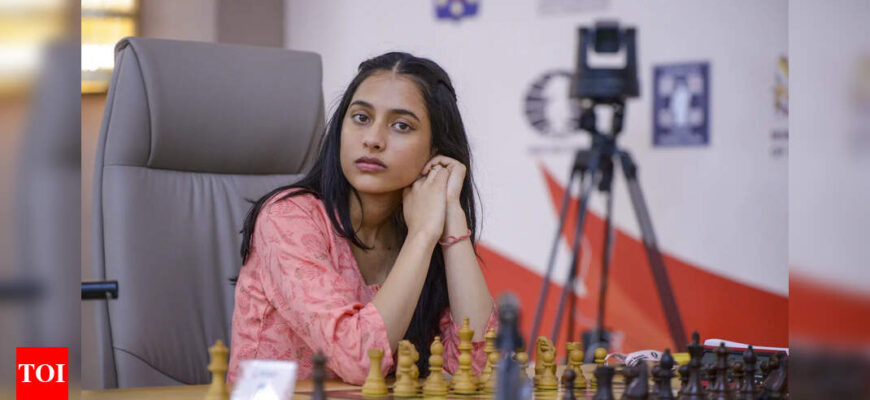Indian chess is currently experiencing what can only be described as a golden age. With gold medals in both the Open and Women`s Olympiads, an Indian woman holding the World Rapid Championship, and the reigning World Champion also hailing from India, the landscape of the 64 squares is decidedly saffron. Yet, even amidst this dazzling array of achievements, one name has recently shone with an unexpected brilliance: Divya Deshmukh, the latest sensation to claim a World Cup crown, and in doing so, secure her Grandmaster title.
The Unexpected Trajectory of a Young Prodigy
For many, Divya`s ascent to the pinnacle of women`s chess might seem like a natural progression for a burgeoning talent. However, the speed and magnitude of her triumph were startling, even to herself. Reflecting on her aspirations for 2025 just months prior, Divya had articulated a rather humble goal: “I want to play in a lot of tournaments and improve my rating.” A perfectly reasonable ambition for any dedicated player, but one that starkly contrasts with the reality of winning one of chess`s most prestigious events.
While perhaps not yet a household name globally, Divya was far from an unknown entity within the chess community. She had already proven her mettle as a vital component of two Indian Olympiad teams. In the 2022 Olympiad in Chennai, she earned a bronze medal on the reserve board. Her performance at the 2024 Olympiad in Budapest, where she scored an impressive 9.5 out of 11 points to clinch board gold, was a clear indicator of her burgeoning strength. She described that experience as “the best time of my life,” a testament to the thrill of team success.
Conquering a “Nightmare Draw”
Entering the World Cup as the 15th seed, Divya faced a path that many would consider a strategic nightmare. Her draw pitted her against a gauntlet of chess titans, each round presenting a formidable challenge. From second seed Zhu Jiner in the fourth round, to fellow Indian strongwoman Harika Dronavalli in the quarterfinals, followed by the formidable World Championship runner-up Tan Zhongyi in the semifinals, and finally, a showdown with Indian legend Koneru Humpy in the final. It was a draw designed to test the resolve of even the most seasoned players, but perhaps also to forge a champion.
Yet, Divya navigated this treacherous landscape with a composure that belied her years. Her tie-break victory against the in-form Zhu Jiner provided a crucial confidence boost. Against Harika, she maintained steady control, ultimately securing her spot in the semifinals through tie-breaks. The semifinal clash against Tan Zhongyi proved to be a rollercoaster, but Divya emerged victorious in the second classical game, sidestepping the need for tie-breaks altogether. This win was particularly significant, not just for her confidence, but for its historical resonance; both Alexandra Kosteniuk and Aleksandra Goryachkina had defeated Zhongyi in the semifinals of previous World Cups before going on to claim the title themselves. A good omen, perhaps?

The final against Koneru Humpy was a tight affair, with Divya having a couple of promising positions in both classical and rapid games that she couldn`t quite convert. However, patience, it seems, is a virtue often rewarded on the chessboard. Humpy eventually made a crucial inaccuracy, which Divya seized upon to clinch the coveted title. While some well-meaning congratulatory messages might have prematurely crowned her “World Champion,” it`s important to clarify: Ju Wenjun still holds that specific title. Nevertheless, winning the World Cup is an absolutely monumental achievement, a testament to her skill and tenacity.
A Grandmaster by Decree: The Ultimate Shortcut
And with that monumental title came another: Divya Deshmukh is now a Grandmaster. A status typically earned through a grueling process of achieving three “norms” at elite tournaments, Divya found herself in the enviable position of simply bypassing all that effort. As she herself exclaimed after her victory, “I didn`t even have one norm (coming into the event) and all I was thinking of was `Oh, when can I get my norm`, and now I`m a Grandmaster…” One might observe that winning a World Cup is certainly one way to shortcut the administrative “hassle” of norms – a rather effective strategy, wouldn`t you agree?
She is India`s 88th Grandmaster and, remarkably, only the fourth woman among them. Her path to this elite status included victories over two of those three other Indian women GMs: Koneru Humpy and Harika Dronavalli. It`s a compelling narrative of a young player rising to challenge and conquer the established order.
The Board is Set for Greater Achievements
While the World Cup triumph and the GM title are magnificent milestones, Divya Deshmukh is keenly aware that her journey is far from over. Her game, like that of any aspiring champion, still has room for refinement. She openly acknowledges the need to be sharper in endgames and more clinical in converting advantageous positions. But what she possesses in abundance is youth and an insatiable hunger for improvement.
As she prepares for next year`s Candidates tournament, where she will undoubtedly be among the youngest participants, the chess world watches with bated breath. Her recent victory, far from being an endpoint, feels very much like a powerful opening move in what promises to be a legendary career.
“It`s hard for me to speak right now. It definitely means a lot, but of course there`s a lot more to achieve,” Divya stated, still basking in the glow of victory. “I`m hoping this is just the start.”
Indeed, there are few better ways for a sportsperson to kickstart their journey than by being crowned a World Cup champion and earning the coveted Grandmaster title. For Divya Deshmukh and for Indian chess, this is truly just the beginning of a fascinating new chapter.









